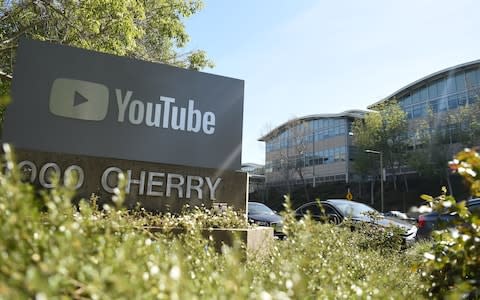Under Armour pulls YouTube ads in fresh extremist video controversy

YouTube is running adverts from major brands alongside extremist content promoting Nazism, conspiracy theories and paedophilia, prompting backlash from advertisers just months after promising to clean up its act.
Adverts for 300 brands and companies, including Under Armour, Amazon, Facebook, Netflix, Adidas, appeared alongside the extremist content, CNN reported.
At least one of the brands, sportswear maker Under Armour, said it had temporarily pulled its advertising until YouTube had addressed the problem.
"We have partnered with our advertisers to make significant changes to how we approach monetisation on YouTube with stricter policies, better controls and greater transparency," YouTube said.
"When we find that ads mistakenly ran against content that doesn't comply with our policies, we immediately remove those ads. We know that even when videos meet our advertiser friendly guidelines, not all videos will be appropriate for all brands."

Several brands threatened to pull their marketing spend from YouTube after videos featuring child abuse content with children in sexually suggestive situations were found on the video-sharing site.
Under Armour's advertising appeared alongside white nationalist content from the channel "Wife with a Purpose".
"We have strong values-led guidelines in place and are working with YouTube to understand how this could have slipped through the guardrails," an Under Armour spokesman said. "We take these matters very seriously and are working to rectify this immediately."
Adverts for a toy brand promoting child development appeared alongside videos that promoted decriminalising paedophilia.
YouTube also ran ads on Nazi channels such as that of Brian Ruhe, who told CNN he didn't want to be called a neo-Nazi, instead referring to himself as a "real, genuine and sincere Nazi". His channel has since had its advertising revenue halted.
Writing in the Telegraph in December, YouTube chief executive Susan Wojcicki said: "Our goal is to stay one step ahead of bad actors, making it harder for policy-violating content to surface or remain on YouTube."
YouTube allows almost anyone to monetise their videos on YouTube, providing the channel reaches a certain number of views. Many brands that advertise on YouTube use filters to ensure their content doesn't appear on unsafe channels, although their videos appeared on objectionable content regardless.
YouTube was last year forced to refund advertisers over videos that had appeared on videos promoting extremist and terror content.
Technology intelligence - newsletter promo - EOA
